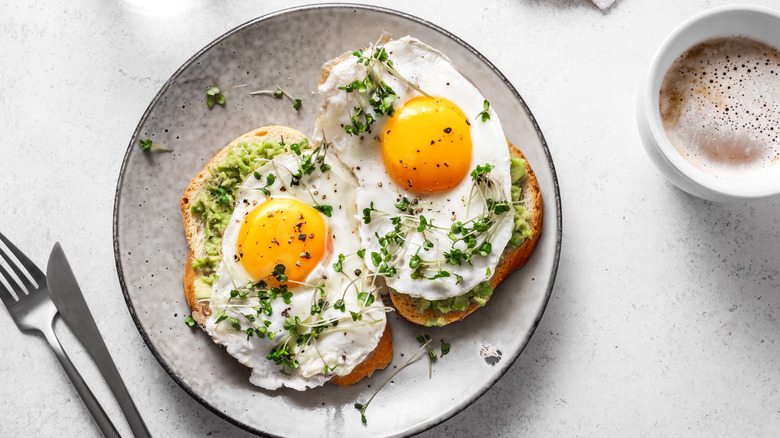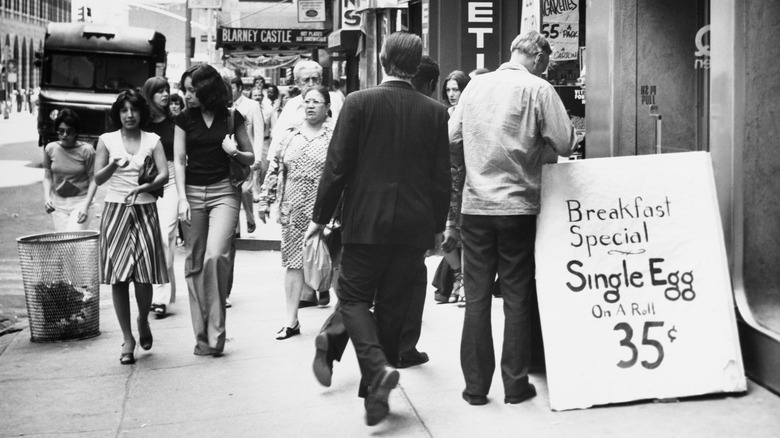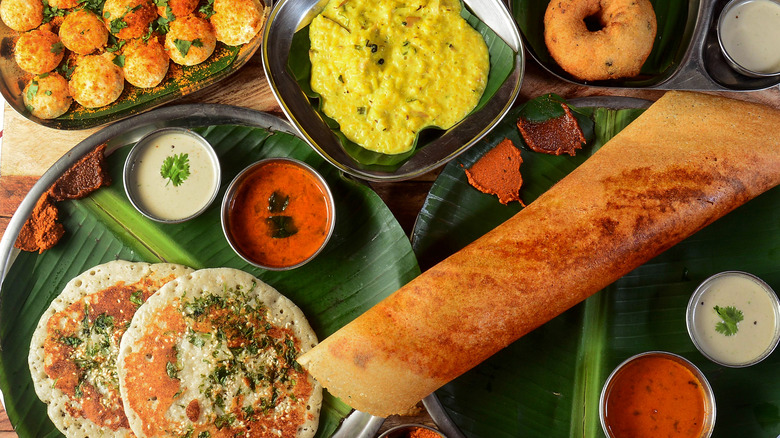How Eggs Became Such An Iconic Breakfast Food
For many breakfast lovers, it can be hard to imagine a traditional morning meal without eggs. While everyone likes their eggs cooked differently, from softly scrambled to over-easy, these bright and sunny proteins are often considered a classic breakfast food in all its forms. Starting the day with eggs is a practice that has been around for so long it's almost tradition, and it's hard to picture a time when they weren't an iconic breakfast item. Still, every hero has an origin story, so here's how eggs became one of the most classic choices for breakfast.
Many people credit early working classes with the initial idea of eating eggs for breakfast. While there is no tale recounting that initial experiment, farmers and laborers in ancient Rome were some of the first people to try it. These workers needed energy in the early mornings, and eggs became their protein of choice because they were much more widely available than meat. Eggs were cheap, easy to prepare, and full of energizing fats and proteins, so the choice made sense.
After its introduction, the tradition of eating eggs for breakfast began to spread throughout Europe. At the time, much of the upper classes objected to breakfast entirely, believing it was gluttonous to eat before dinner, which often started much earlier back then. Still, workers, children, and the elderly needed additional energy, so the eating of eggs in the morning spread.
How eggs, and breakfast, became mainstream
While early farmers and laborers were some of the first to whip up eggs for breakfast, the tradition only spread from there. In one of the earliest known cookbooks The Closet of Sir Kenelm Digby Knight Opened, published in 1669, author Sir Digby suggests eating "freshly-lain" eggs for breakfast. This could suggest that people began to eat eggs in the mornings simply because it was a prominent time of day for chickens to lay them. Later on in England, dinner was slowly eaten later and later, until 5 p.m. was the typical time, and so breakfast started to become a mainstream meal for everyone as the days grew longer. Finally, the Industrial Revolution cemented the act of eating eggs for breakfast, as workers in this age desperately needed morning energy before starting work in the factories.
So, eating eggs for breakfast really is the working man's invention. Still, while breakfast plates laden with eggs and toast remain a popular fixture across America and England among other regions, breakfast looks a little different in other countries.
Why not everyone agrees eggs should be for breakfast
If you venture off into countries in Southern Europe, from Italy to France, or across Asia into places like Japan and India, you might be surprised to find that eggs are not always eaten during breakfast hours. In India, the reasoning usually comes down to dietary preferences. Hinduism is the largest religion in India, and since most Hindus are vegetarian and consider eggs to be meat, eggs are not usually traditional. Instead, you will see things like roti, spiced potatoes, and chutney in their place on the breakfast table, depending on the region. Additionally, in France, breakfast is generally not considered as important a meal as lunch or dinner, so small pastries or bread with butter is often the simple, classic choice for the mornings. Lastly, in Germany, sliced cheese, bread, and deli meats are typically at the core of this country's traditional breakfast, as meat is widely available, so it is much more prominent than eggs.
Every country's traditional morning meal looks different, and there's usually a fun origin story to explain why we eat what we eat for breakfast. Most of the reasoning comes down to what's readily available, whether for its affordability or prominence in the region. Still, sometimes what we eat is dictated by arbitrary things like marketing. So, even if eating eggs for breakfast feels right, don't be afraid to branch out and try something new.


